Prof. Jeremy Simpson

Jeremy Simpson is the Full Professor of Cell Biology at University College Dublin (Dublin, Ireland). He is also currently serving as the Dean of Science at UCD (2021-present). He is the Principal Investigator of the UCD Cell Screening Laboratory, which applies high-throughput and advanced imaging technologies to study intracellular trafficking pathways, diseases associated with organelles of the endomembrane system, and the internalisation routes taken by synthetic nanoparticles on exposure to cells. His lab also develops novel 3D cell models allowing the quantitative study of cell behaviour at multiple scales, with applications in drug delivery. He has authored over 140 peer-reviewed works, including articles in Nature Cell Biology, Nature Communications, Nature Methods and Scientific Reports. His post-doctoral training was carried out at the EMBL (Heidelberg, Germany) (1999-2008) and the University of Warwick (UK) (1996-1998), including long-term secondments at the ICRF (London, UK) and the Scripps Research Institute (La Jolla, USA). His PhD work was supervised by Professor Mike Lord and Professor Lynne Roberts at the University of Warwick (UK).
Zhiran Wang

Zhiran Wang received her undergraduate degree in Medical Laboratory Sciences from Hubei University of Chinese Medicine in 2019, followed by an MSc in Molecular Medicine from Trinity College Dublin in 2020. In 2021, she worked as a research assistant on the STTAR Biorepository project, processing SARS-CoV-2-infected blood samples and contributing to a COVID-19 genomics study investigating host genetic factors influencing infection response. She was awarded a PhD in Bioinformatics and Systems Biology from University College Dublin in 2024. Her doctoral research at Systems Biology Ireland focused on the protective effects of the fibrin-derived peptide FX06 against endothelial dysfunction caused by COVID-19-induced cytokine storms. In May 2025, she joined Prof. Jeremy Simpson’s lab as a postdoctoral researcher. Her current project involves developing an image-based High-Content Screening (HCS) assay for drug discovery, specifically targeting phagocytosis via the SIRPa–CD47 interaction.
Teerna Banerjee
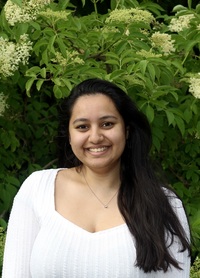
Unmani Jaygude

Unmani is a BTech. Biotechnology graduate from Pune University, India. In 2018 she moved to Dublin, and completed her MSc in Biological and Biomolecular Science from UCD. In 2021 she was accepted on to the Research Ireland Centre for Research Training in Foundations of Data Science, and has started her PhD in the lab of Prof. Simpson, co-supervised by Dr. Graham Hughes. Her project involves analysing data from 3D cellular models in the context of cancer progression. She is specifically focused on small GTPase proteins of the Rab family, and finding links between cell-based experimental data and existing transcriptomic, phylogenetics and network-level datasets. Her work integrates high-content screening data from 3D cellular models with the aforementioned datasets, highlighting the potential of Rab family and its interactors, in cancer progression and metastasis. A systems-level understanding of the Rab proteins and their interactors may shed light on their complex role in disease progression.
Lucy Dornan
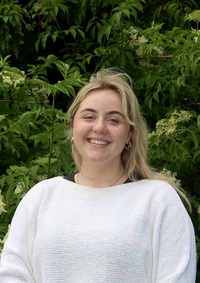
Lucy completed her undergraduate BSc. (Hons) in Cell & Molecular Biology from UCD in 2022, including a final year research project supervised by Prof. Simpson. In 2022, she was awarded a Government of Ireland Postgraduate Scholarship from the Irish Research Council to fund her PhD, and she is now in the third year of her project supervised by Prof. Simpson. She is working to explore the regulation of the Golgi apparatus in mammalian cells, with a focus on the role of the small GTPase Rab6 in facilitating retrograde transport from the Golgi. Using live cell microscopy, Lucy is developing an enhanced understanding of how a wide range of Golgi-resident proteins behave in both steady-state cells and in cells in which retrograde transport has been stimulated. This project aims to provide new foundational knowledge and novel perspectives that will assist scientists studying the Golgi and its pivotal roles in health and disease.
Maëva Lopez
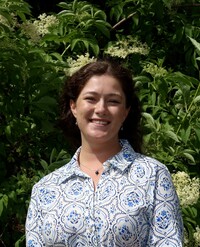
Maëva received her undergraduate BSc. (Hons) in Cell and Molecular Biology from UCD in 2023. She is currently in her second year of PhD study, co-supervised by Prof. Jeremy Simpson and Prof. Susan Quinn (UCD School of Chemistry). Her research aims to gain a deeper understanding of how nanoparticles are transported in cells. To do this she is developing a number of 3D spheroid models which allow for the analysis of the subcellular trafficking and transcytosis of nanoparticles. Her project also involves the synthesis of nanoparticles with organelle-specific peptides on their surface which will enable the precise targeting of nanoparticles to specific subcellular areas. This research will advance our understanding of how nanoparticles are transported in cells so that we can improve their utilisation as drug delivery vehicles.
Danielle Harte
.jpg)
Danielle received her undergraduate degree in 2023 from UCD in Cell and Molecular Biology, and is now in the second year of her PhD. Her project aims to gain a better understanding of the secretory pathway on a single-cell basis in tumour models. Recently it has been seen that cells cultured in 2D versus 3D models have differences in the regulation of secretion, and also that cells within the same tumour have different secretory outputs. To understand this, Danielle’s research involves adapting assays of the secretory pathway using high-resolution quantitative fluorescence imaging for use in 3D multicellular tumour spheroids. Her project aims to provide a novel perspective on how secretion is regulated in tumour models, potentially informing future cancer therapies.
Madeleen Brink
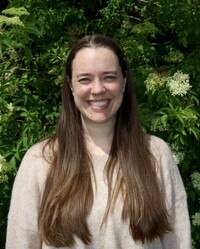
Madeleen Brink completed her Bachelor's and Honour's degrees at the University of the Free State, South Africa. Following this, she finished her Master's in Health Science at the Laser Research Centre, University of Johannesburg, South Africa. She is set to pursue her PhD under the supervision of Prof Jeremy Simpson with the CLEXM Consortium, a Marie Sklodowska-Curie Doctoral Networks Action (MSCA-DN) funded by the European Union under Horizon Europe. Her project aims to track the delivery of nanoparticles into cells by applying correlative microscopy. Soft X-ray tomography (SXT) will be evaluated as an alternative or complementary correlative microscopy method to systematically assess and quantify nanoparticle uptake and distribution in cells.
Vincent (Shaosen) Chueh
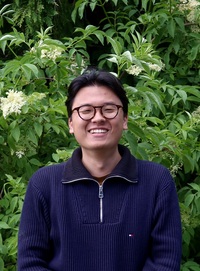
Vincent (Shaosen) is a PhD student in University College Dublin, under the supervision of Dr. Sergey Kapishnikov and Prof. Jeremy Simpson.His research delves into the nexus of computer vision and deep learning, exploring their transformative potential in bioimage and medical image processing and analysis. His current research focuses on developing robust registration and segmentation algorithms for correlative fluorescence light and soft X-ray microscopy images. These efforts aim to enhance the accuracy and efficiency of image analysis, enabling deeper insights into biological and medical processes.
Hend Shayoub
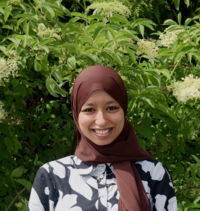
Hend received her undergraduate degree in Chemical Sciences from TCD in 2023 in which she specialised in Medicinal Chemistry. She is currently in her second year of her PhD under the supervision of Prof. Susan Quinn (Primary supervisor) and Prof. Jeremy Simpson (Co-supervisor). Her research focuses on synthesising various carbon- and metal-based nanocomposites and exploring their cellular uptake and localisation. This work aims to develop a better understanding of how varying the physicochemical properties of nanoparticles can influence biological responses, supporting their potential as theranostic agents.